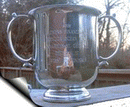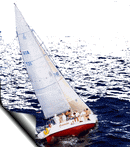
The Race: Angus Phillips article in the Washington Post 6/20/2004
After Bout With Gulf Stream, Air Mail Languishes in the 'Hole'
By Angus Phillips Sunday, June 20, 2004; Page E04
SOMEWHERE IN THE NORTH ATLANTIC
Imbedded with the crew of the sailing vessel Air Mail, I write this from the cluttered navigation station below deck while ghosting along on a sea so windless and still, we recently were passed by a small gob of Sargasso weed riding a half-knot current.
This long lull in the breeze offers no comfort to the seven weary sailors with me who have diligently stood watch on and off for six days, through wild winds and dispiriting calms. They and 39-foot Air Mail, a sturdy, 20-year-old racing sloop, are part of a 36-boat expeditionary force dispatched from the Chesapeake Bay on June 11, bound for Bermuda, 750 miles away.
The fleet travels quietly under sail in mandated radio silence except for twice-daily contact via satellite phone with mission overseers in Annapolis operating under the code name "Grog & Gruel Bermuda Ocean Race," who track their daily progress. Ashore in Bermuda, friendlies wait to greet the mariners should the tedious calm ever break. Some were flown over from the United States to ease the adventurers' reentry, and they already have been waiting longer than expected. Still, 80 miles remain, and where is the wind?
The sailors had plenty of it at first, weathering a stormy run out the Chesapeake in northeast winds before plunging in inky blackness into the rough and windy Atlantic. The leading boats slammed into blocky, six-foot seas 12 hours later as they reached the west wall of the Gulf Stream, the river within the sea where tropical, 80-degree current rushes north, then east, at speeds up to four knots.
The mariners had been briefed beforehand on the difficulties of navigating the Gulf Stream, but nothing they heard prepared their stomachs for the combination of strong northeast winds bashing up against the north-flowing Gulf Stream, which produced a confused, whitecapped sea. Steep waves drove onto each other from every quarter in the blackest part of night, tossing Air Mail around like styrofoam.
In hard times everyone is called to service. I stood the long night watches with Bob Murphy and Ian Newman, graybeards in their fifties, and 23-year-old Kevin Sherwood. Meantime, skipper Tom Carrico and his navigator, Coast Guard Capt. Kip Louttit, crashed below with their watch-mates, Rick Yent and Peter Ljunqvist.
What a night! At the worst, Sherwood, Murphy and I were seasick, racing to the gunwales every 10 or 15 minutes to feed the fishes, and Newman was so far gone he disappeared below without a word. We found him two hours later when the watch ended, sprawled in full foul-weather gear, passed out on the sail bags beneath a steadily leaking hatch.
"I wasn't feeling so good," said the burly Baltimore businessman by way of explanation. "I figured I couldn't do anything else, I might as well get some sleep."
The Gulf Stream is 60 to 80 miles wide and none of it was anything you'd want to see again, at least in those conditions. But the wind at least was off the beam, perpendicular to the course to Bermuda, and strong enough to keep us all barreling along. At one point Sherwood and I sat either side of the tiller watching the wind-meter thrash out readings in the high twenties. We barfed sequentially, one letting fly while the other held the boat on track, then shifting the tiller over to the other to return the favor.
Air Mail made 194 miles the first 24 hours out of the bay, a spectacular run, then 162 the next day, then 132 under brighter skies and softer winds on the far side of the Stream. Ahead loomed the engine that fuels summer weather in the Washington area -- the huge, all but stationary Bermuda High around which breezes spin in a clockwise direction, pumping muggy air into the nation's capital for weeks on end.
At the center of the Bermuda High lies, unfortunately, a Bermuda Hole, the airless middle of the great spinning disc of weather that dictates East Coast conditions, where very little wind blows at all. None, in fact, at times.
It's what makes Bermuda such a fine place to visit in summer, all sunny days with gentle sea breezes as the high sits overhead, unmoving. Golf weather. But if you're heading there by sailboat, you only hope the center of the high lies somewhere off the island proper or you're sailing smack-dab into it.
In the old days you had the benefit of ignorance, not knowing for sure what lay ahead. But for this race Sherwood brought his laptop and Carrico rented a satellite phone. Twice a day they lug all the gear on deck to ring up some main frame in the cosmos and download the latest weather maps, all of which show the Bermuda High lying languorously over downtown Hamilton and Air Mail sitting bound and gagged in the middle of the Bermuda Hole.
You wonder as sailors have forever what the friendlies, the wives and girlfriends and children, are up to, having flown in a day ago on a jet that took 1 hour 10 minutes direct, Baltimore to Bermuda. And us out here six days already, and not a breath of breeze to lift our heavy hearts.
Last night Murphy and I sat on the deck, with his stargazer chart on our laps, and picked out the Big Dipper, Cassiopeia, Scorpio and Cygnus the Swan in the firmament. It was darkest night, with a slim crescent of moon not set to rise till almost dawn, and almost impossible to detect where black sky ended and black sea began.
Air Mail rocked and swayed in the light zephyrs of breeze. "It's almost as if we're just floating along in the sky," said Murphy, as phosphorescence from the sea twinkled below and stars and planets twinkled above.
And so it was, exactly.
Nice, but now the food is running out. Will we ever get there?
The breeze finally returned to the Atlantic early Friday and Air Mail rode it in to Bermuda, where skipper Carrico learned to his dismay that while the 39-footer had held a solid lead on the entire fleet with 121 miles to go, the two-day wait for wind allowed the others to catch up. Air Mail wound up fifth in class.
Overall winner was Free Spirit, a 36-foot Pearson from Moselle, Miss., skippered by Tom Stokes. The U.S. Naval Academy won in classes 1 and 2 with the entries Patriot and Swift; class 3 was won by Mental Floss of Alexandria, and class 4 by Sanderling, a C&C 35 skippered by Jerry Ormsby of Annapolis.
© 2004 The Washington Post Company
![]()
This site was last updated 05/08/10



